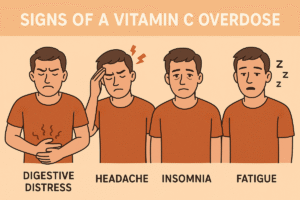Ever popped a few extra vitamin C tablets thinking you’ll fight off that cold faster? Yeah, we’ve all been there. But can you actually have too much of a good thing? Let’s find out what the science says about vitamin C overload—and what it could be doing to your body.
What Even Is Vitamin C, Really?

Vitamin C (also called ascorbic acid) is that golden boy of the vitamin world. It’s:
-
An antioxidant
-
A big player in collagen production
-
Crucial for your immune system
-
Found in fruits like oranges, strawberries, kiwi, and veggies like bell peppers and broccoli
So yeah, your body loves it. But here’s the catch—you can’t store it. Any extra? You pee it out. And that’s exactly why some folks think they can take as much as they want. But hold up—too much vitamin C can come with a few not-so-fun surprises.
Daily Vitamin C Intake: How Much Is Too Much?
Before we go overboard with citrus and supplements, here’s what experts say about how much you should actually be getting:
| Group | Recommended Daily Amount (RDA) |
|---|---|
| Adult men | 90 mg |
| Adult women | 75 mg |
| Smokers | +35 mg more than the standard |
| Upper limit (max safe daily dose) | 2,000 mg |
Source: NIH Office of Dietary Supplements
Now remember, that upper limit isn’t the goal. That’s the max before things might start going sideways.
What Happens If You Take Too Much Vitamin C?

You’re probably wondering: Is vitamin C bad for you if you go overboard just once or twice? Not necessarily. But chronic high doses? That’s when problems creep in.
Here are the signs of vitamin C overdose you gotta look out for:
1. Tummy Troubles
Let’s not sugarcoat this—diarrhea, nausea, and stomach cramps are common if you’re going hard on the C.
“Anything over 1,000–2,000 mg at once can irritate your GI tract,” says Dr. John T. Dorr, MD.
2. Kidney Stone Risk
Yup. You read that right. Does vitamin C cause kidney stones? It can.
Vitamin C turns into oxalate in your body—a compound that binds with calcium to form those painful little stones. Studies show this risk especially jumps in men.
Source: JAMA Internal Medicine, 2013
3. Absorption Issues
High doses of C can mess with the way your body takes in other nutrients—like B12 and copper. It might even increase your iron absorption to risky levels if you’ve got a condition like hemochromatosis.
4. Skin Flushing and Insomnia
Some folks report feeling flushed, restless, or getting weird skin rashes after taking mega-doses. That’s your nervous system saying “yo chill.”
But It’s Just Vitamin C, Right? It’s Water-Soluble!
Yeah, that’s what makes this tricky. Since your body doesn’t store it, it seems harmless. But think of it like this:
If you keep dumping gallons of water on a plant every day—even if the water’s clean—you’ll drown it eventually.
Same with your body. Too much of even a good thing? Bad news.
Vitamin C Supplements: When It Becomes a Problem
We’re not talking about eating 10 oranges here. That’s hard to do. The real issue? Supplements.
Some of those fizzy immune-boosters and “mega dose” tabs have 500 to 1,000 mg per serving—and people take multiple a day thinking they’re supercharging their immune system.
Let’s break it down:
| Product Type | Typical Dosage |
|---|---|
| Emergen-C packet | 1,000 mg |
| Chewable tablet | 500–1,000 mg |
| High-dose capsule | Up to 2,000 mg |
If you’re taking these every day on top of eating fruit? You could be doubling or tripling the safe limit.
Does More Vitamin C Mean More Immunity?
Here’s where the myths kick in. Many people think loading up on vitamin C = never getting sick.
The truth? Vitamin C helps shorten colds a little (like maybe 1 day shorter). But going above 200 mg daily won’t give you much extra boost.
“The belief that massive doses of vitamin C will keep you invincible just doesn’t hold up scientifically,” says Dr. Linus Pauling Institute, Oregon State University.
So unless you’re hiking in the Arctic or under extreme physical stress, you’re probably fine with the RDA.
Common Myths About Vitamin C Dangers
Let’s bust some popular vitamin C myths:
1. You can’t overdose on vitamin C
Wrong. You can. Maybe not in the classic toxic way, but your gut and kidneys will definitely feel it.
2. Vitamin C prevents all illness
Nope. It helps, but it’s not a magical cure. It supports your immune system—it doesn’t make it bulletproof.
3. Natural sources are risky too
Nah. You’re not gonna OD on oranges or bell peppers. Whole food sources are way more balanced.
FAQ: You Asked, We Answered
Q1: Can vitamin C cause kidney stones?
Yes. Especially if you’re taking mega-doses regularly. The oxalate buildup can lead to stone formation.
Q2: How do I know if I’ve taken too much?
Look for signs like diarrhea, bloating, cramps, and frequent urination. Those are red flags.
Q3: What’s the safest way to get enough vitamin C?
Just eat a variety of fruits and veggies daily. If you supplement, stick close to 100–200 mg max unless told otherwise by a doctor.
Q4: Can kids have too much vitamin C?
Absolutely. The upper limit for children is much lower—around 400 mg for ages 4–8. So keep those gummies in check.
The Bottom Line: Is Too Much Vitamin C Dangerous?
So here’s the deal—you need vitamin C. It’s essential. But more ≠ better.
If you’re healthy, eating a balanced diet, and not under extreme physical stress, you probably don’t need more than what nature gives you.
But if you’re loading up on tablets, powders, and shots every day? You might be walking a fine line.
And yeah, “natural” doesn’t mean harmless. Always treat supplements like medicine. That means read labels, follow dosage guidelines, and talk to your doc if you’re unsure.
TL;DR Summary Table
| Topic | Quick Takeaway |
|---|---|
| Safe daily intake | 75–90 mg for adults, 2,000 mg max limit |
| Overdose signs | Diarrhea, nausea, kidney stones, rashes |
| Common sources | Citrus fruits, bell peppers, strawberries |
| Supplement risk | Easy to go overboard with tablets/powders |
| Best advice | Stick to food-based sources, supplement wisely |
Sources
-
NIH Office of Dietary Supplements – Vitamin C Fact Sheet – 2024
-
JAMA Internal Medicine – Vitamin C Supplementation and Kidney Stones – 2013
-
Linus Pauling Institute, Oregon State University – Vitamin C Research – 2024
-
Harvard Health – Can You Take Too Many Vitamins? – 2023


